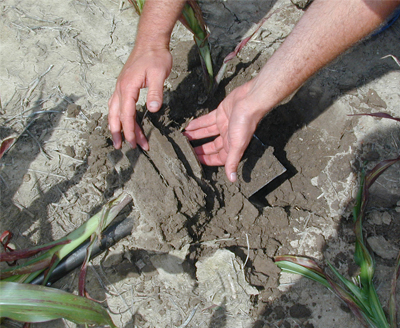
- Compaction is most likely in soils that are atfield capacity.
- Compaction reduces pore space, changes physicalstructure, and increases soil strength.
- Compaction prevents plant roots from developingnormally, inhibits nutrient and water uptake, and causes water managementproblems.
- The four common types of compaction are plowlayer, surface, sidewall, and deep.
While we are sometimes anxious in the springto get busy in the fields, performing field operations when soils are too wetcan cause big problems with soil compaction – problems that are not easilycorrected after the damage is done. Soil compaction takes four primary formsand each has different causes. All formsof soil compaction are negative to the crop and most can be avoided with soundmanagement and patience.
The different types of soil compaction haveone thing in common – the worst compaction does not occur with heavilysaturated soils, but instead with soils that are at field capacity. Fieldcapacity is the point at which the soil will hold water against the force ofgravity, although the excess has drained out. At this point, some of the pore spaces are filled with air instead ofwater, but there is still enough water that it can serve as a lubricant betweensoil particles, allowing them to slide and collapse against each other. As this happens, natural pore spaces alsocollapse, eliminating oxygen. Crop rootswill not grow or function normally in oxygen-deprived soil.
With compacted soils, we’re really dealingwith two major issues:
1. Compactionalters the natural soil structure and increases the physical strength of thesoil, preventing crop root systems from fully exploring to take up nutrientsand water. Soils that are compacted inlayers often will hold surface ponds of water early in the season, but canbecome dry and impenetrable to water later in the season.
2. Compactioneliminates air (oxygen) from the soil, so crop roots cannot take up nutrientsor water, even when they’re surrounded by it.
‘Plow Layer’ Compaction is the most common and widely known form ofsoil compaction. This develops withequipment traffic and use of certain implements, such as the disk. A well-defined layer develops just below thedepth of tillage. Look for a distinctiveplaty or blocky structured soil layer between six and eight inches deep (seeImage 1).
Surface Compaction develops when repeated tillage destroyssoil structure in the top inches of the soil profile and/or heavy rainfallcauses soil particles to settle together into a dense layer. Surface compaction also readily develops withno-till cropping when field traffic occurs before soils dry adequately. Surface compaction may or may not includesoil crusting, and it need not be as dense as the plow layer to cause cropproblems. Look for soil that appears tobe lacking in pore spaces, will not easily crumble in the hands, and has ablocky or platy structure.
Sidewall Compaction is another familiar form ofcompaction. In wet soil, one type ofsidewall compaction develops when the opener disk of the planter smears theside walls of the seed slit or furrow which roots have difficulty penetrating. In many cases, shrinkage of the drying soilcauses the seed slit to pull open. Lookfor the distinctive seed slit with smeared walls, and roots that grow in a fanshape as they grow the only direction that they can.
Sidewall compaction can also develop withanhydrous ammonia toolbars and side-dress applicators, again when operationsare done under adverse soil conditions. Sidewallcompaction may interfere with lateral root growth and may result in a soilfracture that allows nitrogen to be lost to the atmosphere as ammonia gasfollowing application. Initial diagnosisis as simple as occasionally walking over applied acres immediately following anhydrousammonia application to see if you can detect an ammonia odor. Use a spade to cut perpendicular sectionsacross the application track to check whether sidewall compaction is occurring.
Deep Compaction is the general compaction that developsbelow the eight to ten inch depth in the soil. This compaction is usually caused by heavy equipment loads on wet soilsor soils at field capacity. Effects cansometimes be detected twenty inches deep in the soil or more. Correction of deep compaction can take manyyears and often includes deep ripping under dry soil conditions, as well asplanting and maintaining alfalfa or other deep-rooted forage or cover crops forseveral years.